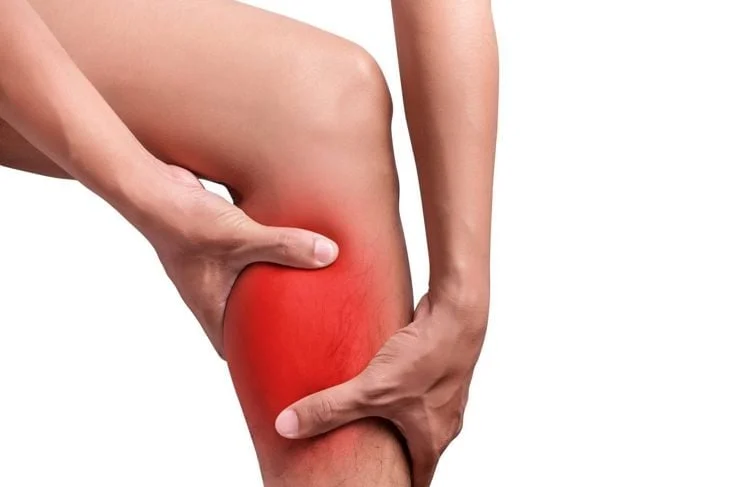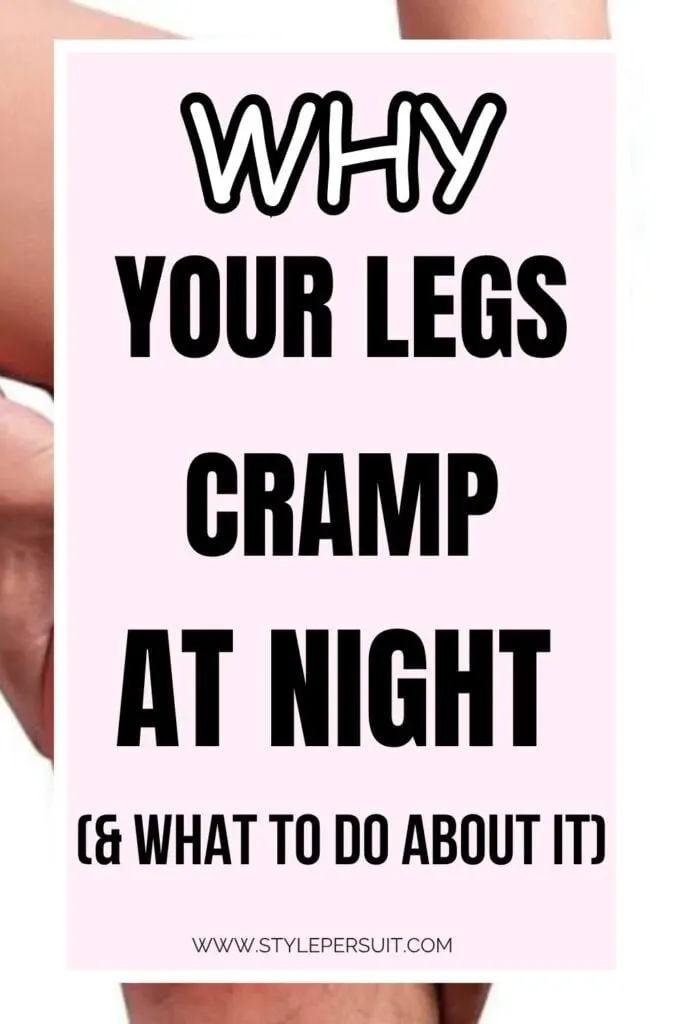You’re sound asleep, or at least you were. Then, out of nowhere, your calf locks up like a vise. One second, you’re dreaming.
The next, you’re contorted in bed, clutching your leg like it’s trying to detach itself.
Sound familiar?
Nighttime leg cramps are one of those strange, annoying, borderline painful things that so many people experience, yet no one really talks about.
They’re common. They’re disruptive. And they’re usually brushed off as “just one of those things.”
But here’s the thing: you don’t actually have to suffer through them.
Let’s talk about what causes these mystery cramps, how to stop them when they strike, and what you can do to prevent them from hijacking your sleep ever again.

That Sudden Charley Horse Feeling
You know that feeling—tight, sharp, unforgiving. A cramp that comes out of nowhere, usually in your calf, though sometimes it hits your foot, thigh, or even behind the knee.
It twists the muscle up like it’s in a knot, often leaving it sore for hours (or even days) afterward.
They’re called nocturnal leg cramps or, more casually, night leg cramps. Not to be confused with restless leg syndrome, which involves a constant urge to move rather than sudden pain.
These cramps usually hit in the middle of the night, often during light sleep stages or right as you’re drifting off.
And yes, they tend to get more common as we age.
So what’s the deal?
What Actually Causes Night Leg Cramps?
The truth? It’s usually not just one thing. It’s a perfect storm of little factors, dehydration, muscle fatigue, low minerals, and sleeping position.
But let’s break it down in a way that actually makes sense.
1. Dehydration
Muscles need water to function properly. Without enough hydration, especially after sweating, exercising, or even traveling, the muscles can misfire.
They twitch. They spasm. And sometimes… they cramp.
But here’s what many people don’t realize: drinking a ton of water isn’t always the fix.
If you’re flushing out too much sodium, potassium, or magnesium without replacing them, you’re back to square one (or worse).
So it’s not just about drinking more water, it’s about getting the right kind of hydration.
2. Electrolyte Imbalance
You’ve probably heard this one tossed around—usually right before someone hands you a sports drink. But it matters.
Your muscles need a delicate balance of:
- Magnesium
- Potassium
- Calcium
- Sodium
When even one of those drops too low, it can throw off how your muscles contract and relax.
And that’s when cramps tend to sneak in.
It’s especially common in people taking certain medications (like diuretics), or those on very low-carb or low-sodium diets.
3. Overuse or Muscle Fatigue
Did you walk more than usual? Try a new workout? Stand all day?
Sometimes, it doesn’t even feel like “overuse,” but the muscle’s tired all the same.
Add in some dehydration or low magnesium, and it’s basically asking for trouble once you lie down.
You might not notice soreness until you’re horizontal, and that’s when the cramps show up uninvited.
4. Poor Circulation or Nerve Issues
Less common, but worth mentioning.
Conditions like peripheral artery disease or pinched nerves can cause pain and cramping in the legs, especially at night when blood flow slows down.
If cramps are severe, frequent, and happen alongside numbness or tingling, it’s worth asking your doctor to take a closer look.
5. Weird Sleep Positions
Yup, sometimes it’s that simple.
Pointed toes, knees locked out, legs twisted oddly around a blanket, your muscles hold those positions longer than they should.
It’s like a low-level stretch that never releases, and eventually, the muscle just snaps into cramp mode.
Side sleepers, we’re looking at you.
The Magnesium Connection: Quiet but Mighty
Magnesium is a bit of a sleeper mineral (pun intended). It doesn’t get the spotlight like calcium or iron, but it quietly supports over 300 processes in the body, including muscle and nerve function.
Low magnesium levels can make your muscles more excitable. Meaning they contract easily… and don’t relax when they should.
And here’s the kicker: blood tests often miss low magnesium because most of it lives in your cells and bones, not in the bloodstream.
What helps?
- Magnesium-rich foods: spinach, pumpkin seeds, almonds, dark chocolate, avocados
- Magnesium glycinate: gentle on the stomach, good for relaxation
- Magnesium spray: absorbs through the skin, great for people with sensitive digestion
- Epsom salt foot soaks: especially helpful before bed
A lot of people find that adding magnesium (even just a nightly foot spray) makes a noticeable difference in cramp frequency and sleep quality.
Stretching Before Bed Isn’t a Joke
It sounds simple. Maybe even too simple. But light stretching before bed can actually work—especially for calves, hamstrings, and feet.
Here are a few easy moves that take less than 5 minutes:
Calf Stretch at the Wall
- Stand facing a wall
- Place one foot behind you, heel down
- Bend your front knee until you feel a stretch in the back leg
- Hold 20–30 seconds on each side
Toe Pull with a Towel
- Sit on your bed with legs stretched out
- Loop a towel or resistance band around the ball of your foot
- Gently pull toward you
- Hold, then switch sides
Standing Hamstring Stretch
- Place one foot on a low surface (like the edge of the bed)
- Keep both legs straight
- Lean forward slowly until you feel the back of your thigh stretch
Consistency is key. This isn’t a one-night miracle fix, but a small nightly habit that trains your muscles to stay looser, even during deep sleep.
When Cramps Strike: What to Do Right Now
Okay, so you’re in the middle of a cramp. It’s 3 a.m., your calf is on fire, and you’re basically frozen in place. Here’s your emergency response kit:
- Straighten your leg and pull your toes toward you. If you can’t reach, use a towel or belt.
- Stand up (if possible) and gently press your heel into the ground to stretch the muscle.
- Massage the muscle with your hand or use a massage gun on low setting.
- Apply heat (like a heating pad or warm towel) to help it relax.
- Breathe slowly and deeply—tensing up makes the pain worse.
Sometimes, just knowing what to do takes the panic out of the situation.
Drink Smart, Not Just More
We talked about hydration already, but let’s add some nuance. If you’re constantly downing water and still getting cramps, try adding minerals.
Options to explore:
- A pinch of Himalayan salt and a squeeze of lemon in your water
- Coconut water (natural potassium source)
- Low-sugar electrolyte powders like:
- LMNT
- Liquid I.V.
- Nuun
- Ultima Replenisher
And no, sports drinks like Gatorade aren’t your only option—and they often come loaded with sugar.
Could It Be Something More Serious?
If leg cramps happen:
- Nightly, for weeks on end
- In both legs at once
- With numbness, tingling, or swelling
- Alongside other symptoms like fatigue or cold feet
…then it’s smart to rule out underlying conditions like:
- Peripheral artery disease (PAD)
- Kidney disease
- Spinal nerve compression
- Cirrhosis or other liver problems
This isn’t about scaring anyone, it’s about paying attention when the usual fixes don’t seem to touch it.
Old Wives’ Tales and Strange But True Remedies
Let’s be real: when you’re desperate, you’ll try anything. And over the years, some weird remedies have picked up devoted fans.
- Pickle juice – Works surprisingly fast for some people due to vinegar and salt
- Yellow mustard – One spoonful (the vinegar + turmeric may help)
- Soap under the sheets – No one knows why, but people swear by a bar of Ivory soap near their legs
- Bananas – Famous for potassium, but may not help unless you’re truly deficient
Are these placebos? Maybe. But if it works, it works.
Building a Simple Routine That Helps
If you want to stop leg cramps at night consistently, think of it like managing a little ecosystem.
Try this rhythm:
- Drink mineral-rich water during the day—not just plain water
- Stretch before bed (seriously, just 3–5 minutes)
- Take a magnesium supplement or spray your legs/feet
- Sleep with your feet in a relaxed, neutral position (avoid pointing toes)
- Move daily, but avoid overexerting your legs late in the evening
One Last Thought
Nighttime leg cramps aren’t a mystery you have to live with. Your body’s trying to tell you something about your hydration, your minerals, yand our daily movement.
And while the fix might not be instant, it’s usually not complicated either.
So the next time your leg locks up mid-dream, remember this article. Breathe, stretch, hydrate. Try a magnesium spray. Put the banana next to the bed if it helps.
You don’t have to just “deal with it.”
Sleep is sacred. And you deserve all of it.

